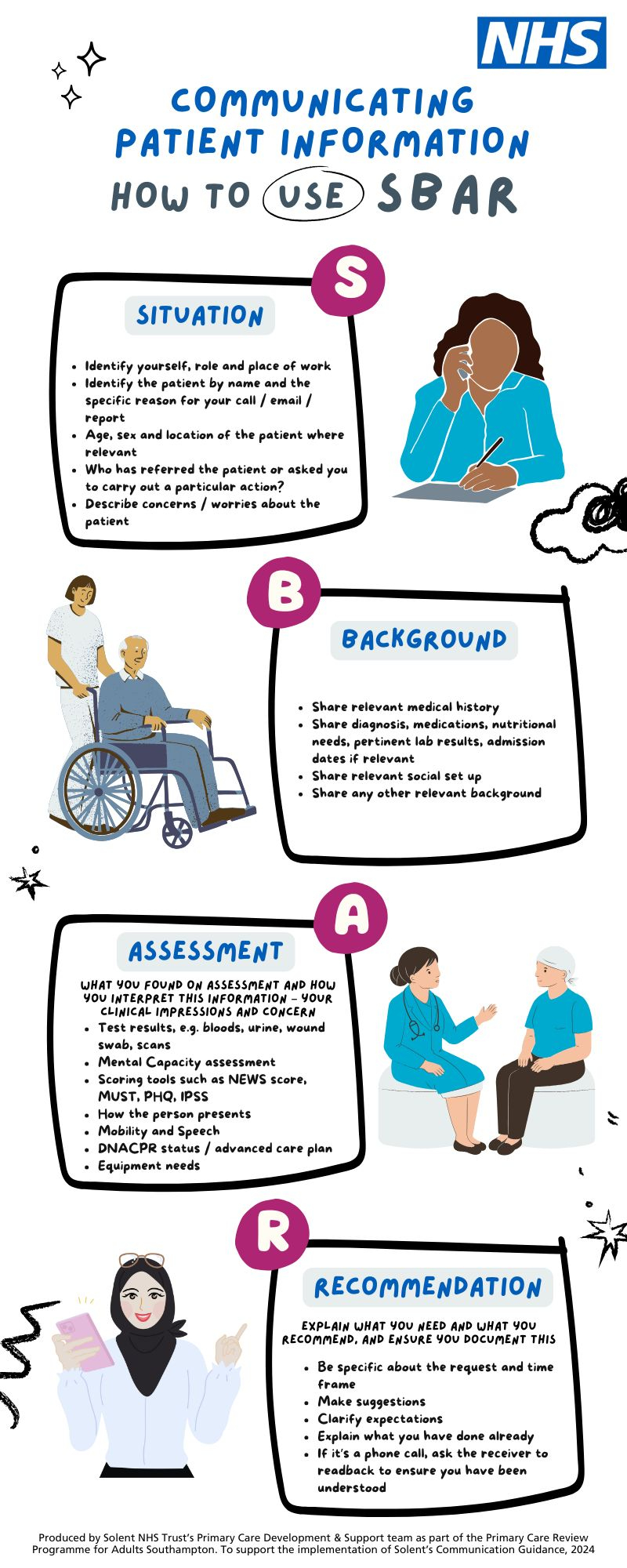What we do
The Primary Care Development team aims to improve and develop engagement, communication and integration between our community services and Primary Care (GP Practices). We do this through building positive working relationships and creating innovative ways of working to enable integration between our community services and PCNs. Our team is also actively involved in supporting Integrated Neighbourhood Working in the areas we work.
How we can help
If you work in Primary Care or are a community partner, and have a support or development need, with the aim of improving communication or integration between our services and Primary Care, or if you have an idea to discuss, please get in touch with us.
Our projects and resources
Please use the dropdown boxes below to read more about our projects and access our resources.
This innovative project set out to identify key areas for small changes that will help bring closer integration and alignment between Solent’s adult community services and primary care.
The programme involved three local GPs spending time observing our community nursing, community independence service and urgent response teams in action. They were able to see first-hand the excellent work delivered by teams, and came away with a deeper understanding of how clinicians in Primary Care can get the best from the services around us.
Following the review, three key workstreams were identified (SBAR, Multidisciplinary team meetings and communication) and working groups were set up to drive the work forward. The continued work of these workstreams can be seen more in the dropdown boxes below.
We have also published a short evaluation report to share the findings from this work, and we are keen for this to be shared as widely as possible. The outcomes, resources and learning from this work can be translated across services and geographies.
SBAR ('Situation', 'Background', 'Assessment', 'Recommendation'), is a structured communication tool which supports structured handover of relevant information and referrals quickly - to communicate with confidence. Whilst it has been used within the Trust for many years, its use has been sporadic and with varying effectiveness. The Trust understands the value in this tool when used effectively, and as such, our team has developed training for Community Teams and Primary Care to enable them to use the tool effectively. We are currently carrying out an impact review of the use of SBAR across our community nursing teams, and hope to spread this work across the Trust and to our partners.
To support the use of SBAR and unify our resources, we have consulted with our Working Group and colleagues in Community Nursing and CIS, and agreed on the strapline: SBAR: Communicate with confidence.
We have put together the following resources to support you to use SBAR in your practice:
- SBAR training packages - each package consists of a video, an infographic and a self-reflection worksheet. The training packages can be accessed through the NHS England Learning Hub. The Primary Care version can also be viewed through Vimeo.
- 'SBAR of an SBAR' - we have written an 150 word summary of SBAR in the format of SBAR, to demonstrate SBAR in practice. This is a single A4 sheet, which would be ideal as a poster and for sharing on social media.
- Impact evaluation report 2-page PDF showcasing the impact of SBAR on teams within the Trust, and the impacts you will see if you implement SBAR in your practices and with your teams.
- Blog post - we have written an easy-read blog post summarising our SBAR impact evaluation and call to action.
- 'Call to action' flyer / poster - we have produced a flyer / poster to highlight key actions to take regarding implementing and using SBAR.
- SBAR image / graphic - this image summarises what SBAR stands for. It can be used as a poster, and is also ideal for sharing on social media.
We recognise the importance of Multi-Disciplinary Team meetings (MDTs), especially to support the most complex patients we care for.
Complex Care MDTs
Our Trust runs weekly ‘Complex Care MDTs’ in each of the three localities within Southampton city, which bring together a range of health and care professionals. Through the work of the Southampton Primary Care Review Programme, we were able to streamline this process, including referral criteria and using SBAR as the basis for patient discussion.
We have actively sought ways to improve GP representation at these meetings; any GPs with patients on the list to be discussed are now emailed 2 days before the meeting to invite them to attend. We also welcome GPs to refer patients into our Complex Care MDT meetings, even if they are not previously known to the service. Patients are prioritised for discussion if there is representation from the relevant primary care setting. To refer patients to Complex Care MDT, please email the relevant email address and provide a referral in the format of SBAR. We have also produced a flyer with more information.
East locality (meetings are on Tuesdays, 09:30-10:30)
West locality (meetings are on Wednesdays, 09:00-10:00)
Central locality (meetings are on Thursdays, 09:00-10:00)
Primary Care MDT meetings
Several of our community teams are also involved in supporting practice-level and PCN-level MDT meetings. One really successful practice-level MDT with excellent engagement is Stoneham Lane Surgery. We have produced to Good News Story to showcase the successes of this MDT meeting, including what's working well, why it matter for GPs and a call to action.
MDT Mapping
As part of the Southampton Primary Care Review Programme, we also carried out a mapping exercise and produced a mapping spreadsheet to show all the MDTs running across Southampton city; those run by our Trust, as well as those run by GP practices or at PCN level. We are keen to fill in the gaps, so please contact us if your information needs updating.
Communication through the ICB's channels
The team recognises that effective communication is key to ensuring good relationship between services. We aim to share information through the ICB’s communication channels. In 2024, we put together a series of articles, showcasing the learning from the Primary Care Review Programme. You can access these articles here.
Engagement meetings with PCNs
All Southampton PCNs and Practices were contacted in Autumn 2024 to offer the opportunity to meet with their locality community teams (Community Nursing and CIS). The aim of these sessions was to build relationship and to hear from practices and PCNs about challenges, opportunities and priorities, especially with a focus on shared care of frail patients. Meetings were held between Dec 2024 and Feb 2025 with Central PCN, North PCN, SeaCity PCN, West PCN and Woolston & Townhill (SPOFS Neighbourhood). A summary PDF has been produced, showing the key themes and actions from these meetings.
Development of communications guidance
We are in the process of developing guidance for how routine vs urgent communication (both patient information and other information) is made between our services and Primary Care.
Who's Who Padlets
When we speak to our Primary Care colleagues, we often receive feedback such as GPs not knowing who they community nurses are, or not knowing how to refer into a particular service.
We have produced three ‘Padlets’, which give a visual ‘Who’s who’ of each of the three community nursing and CIS locality teams within Southampton. They can be accessed below:
- Central locality 'Who's Who' Padlet
- East locality 'Who's Who' Padlet
- West locality 'Who's Who' Padlet
To support other teams to set up their own Who's Who Padlet, we have created a Who's Who Padlet 'How to Guide'. If you require any further information, please email Annemarie.
Directory of Adult Services in Southampton
We have also produced a ‘Snapshot Directory’ of Adult Services in Southampton, which local GPs and their teams can use to understand more about the breadth of services we provide, how to refer in, and key contact information.
In late 2023, a shared care clinic was set up in Solent GP Practice once a week, for patients across the Central PCN in Southampton. The clinic aimed to upskill practice nurses, build relationships and improve integration between services. The clinic enabled 6-8 patients each week to be seen for care of PICC lines, catheter care, nephrostomy care and rocket drain care. We have produced a good news story to showcase this innovative project. Our community nursing service is keen to extend the project to other PCNs; if this is of interest, please get in touch with us.
Hampshire and Isle of Wight Integrated Care Board (ICB) stood up a transformation programme which focuses on primary and local care; addressing same day access, urgent care response, integrated neighbourhood working (INW), proactive case management, virtual wards, and telemedicine, asking for local place systems to develop their own local operating model to meet the needs of their communities.
In April 2024, a Southampton INW Task and Finish Group (TFG) was set up to help drive the programme forward. The group included colleagues from Health and Social Care, Public Health, alongside the Project Lead and Coordinator. The group’s purpose is to develop and mobilise integrated neighbourhood working models which meet the need of the local population. The INW programme has been co-designed to enable partnership working within areas loosely defined by each of the PCN footprints. The TFG provides regular progress reports to the Southampton & Local Care group (PLC), whose members are from Southampton health, care, and voluntary sector, to inform progress and enable them to uphold their responsibilities in providing oversight and accountability of the programme.
INW Padlet
As part of our project journey so far, we have spent a great deal of time researching and developing documents that we felt would be useful put together on Padlet, to share with others to aid with INW thinking. You can view this Padlet here.
INW Hubs
We have created a logo for use by the INW Hubs in Southampton, in variety of colourways. These are available below, all as PNG files on transparent background. Please select the option you would like to view and download (please note these are password protected, so please contact Annemarie Aburrow, Primary Care Engagement Coordinator for the password):

